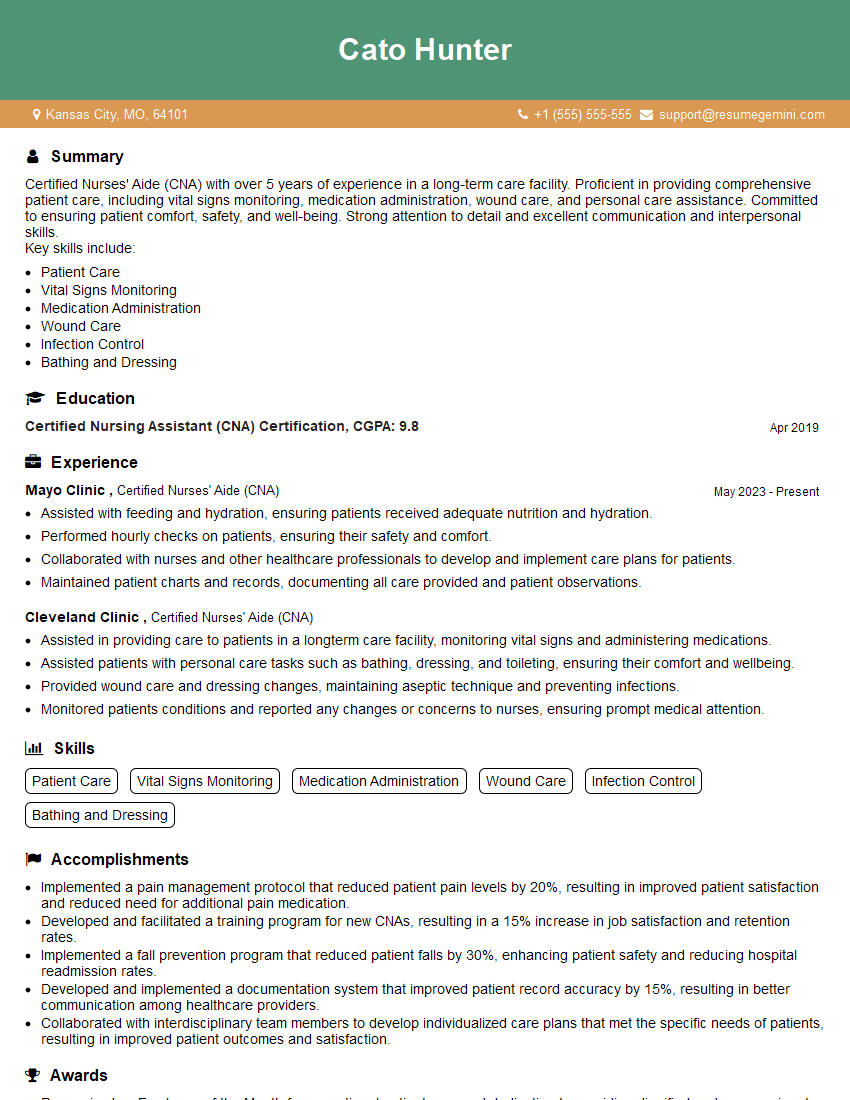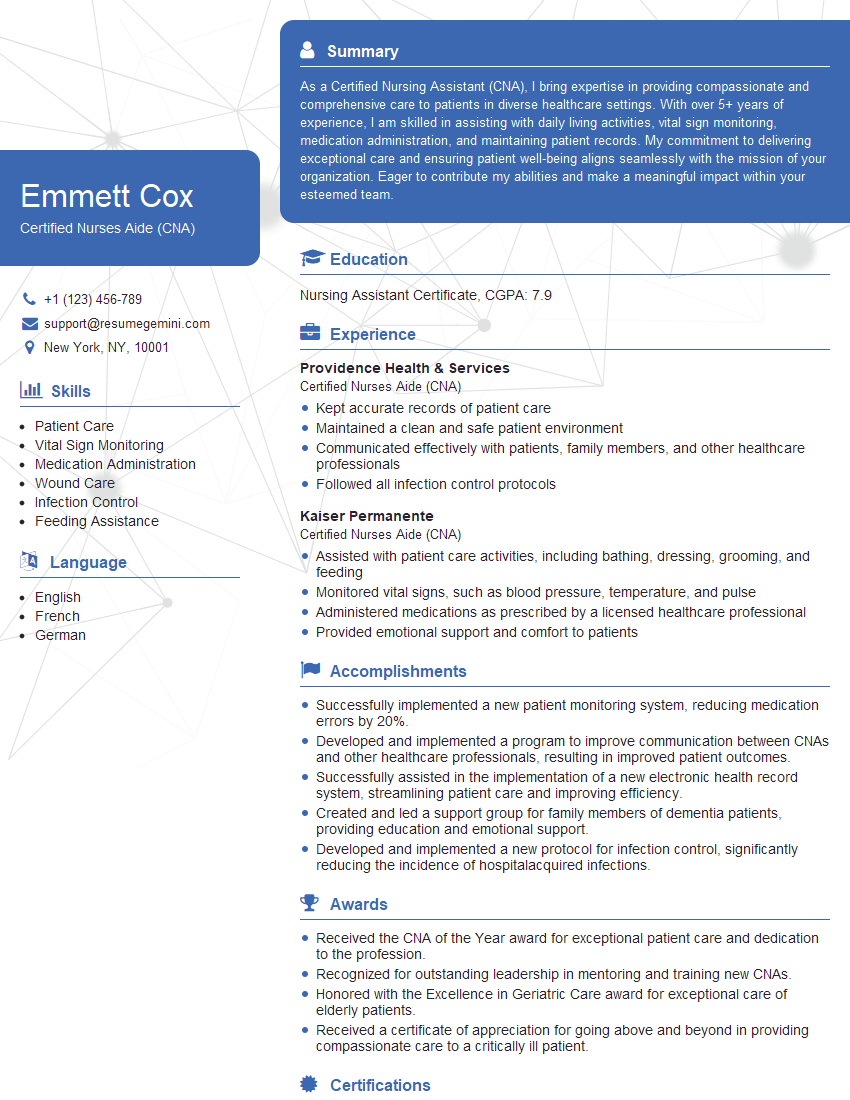Ever felt underprepared for that crucial job interview? Or perhaps you’ve landed the interview but struggled to articulate your skills and experiences effectively? Fear not! We’ve got you covered. In this blog post, we’re diving deep into the Certified Nurses’ Aide (CNA) interview questions that you’re most likely to encounter. But that’s not all. We’ll also provide expert insights into the key responsibilities of a Certified Nurses’ Aide (CNA) so you can tailor your answers to impress potential employers.
Acing the interview is crucial, but landing one requires a compelling resume that gets you noticed. Crafting a professional document that highlights your skills and experience is the first step toward interview success. ResumeGemini can help you build a standout resume that gets you called in for that dream job.
Essential Interview Questions For Certified Nurses’ Aide (CNA)
1. Describe the principles of infection control and how you apply them in your daily work?
- Maintain a clean and disinfected environment.
- Wear appropriate personal protective equipment (PPE) when necessary.
- Practice proper hand hygiene.
- Dispose of medical waste properly.
- Follow isolation protocols as needed.
- Report any suspected infections to the appropriate authorities.
- Educate patients and visitors about infection control practices.
2. How do you promote patient safety and prevent falls?
Assessing patient risk for falls
- Use a fall risk assessment tool to identify patients at risk.
- Observe patients for signs of instability, such as weakness, dizziness, or confusion.
- Review the patient’s medical history for any conditions that may increase their risk of falling.
- Talk to the patient and their family about any concerns they have about falls.
Implementing fall prevention measures
- Make sure the patient’s environment is safe, free of tripping hazards and clutter.
- Provide the patient with assistive devices, such as a cane, walker, or wheelchair, if necessary.
- Encourage the patient to wear sturdy, non-slip shoes.
- Educate the patient and their family about fall prevention strategies.
3. How do you handle aggressive or resistive patients?
- Remain calm and non-threatening.
- Try to understand the patient’s needs and concerns.
- Speak to the patient in a respectful and reassuring manner.
- Avoid using physical force unless absolutely necessary.
- If physical force is necessary, use the least amount of force possible.
- Get help from other staff members if needed.
4. How do you provide physical and emotional support to patients?
- Provide a listening ear and offer words of comfort.
- Help patients with their activities of daily living, such as bathing, dressing, and eating.
- Create a positive and supportive environment.
- Respect the patient’s privacy and confidentiality.
- Advocate for the patient’s needs.
5. How do you communicate effectively with patients and their families?
- Use clear and concise language.
- Be respectful and attentive.
- Listen to the patient’s concerns and answer their questions honestly.
- Avoid medical jargon and use terms that the patient can understand.
- Involve the patient’s family in the care plan as appropriate.
6. How do you document patient care accurately and completely?
- Use a standardized format for documentation.
- Record all relevant information, including the patient’s vital signs, medications, and treatments.
- Document any changes in the patient’s condition or behavior.
- Use clear and concise language.
- Date and sign all documentation.
7. What are your ethical responsibilities as a CNA?
- Respect the patient’s autonomy and decision-making capacity.
- Maintain the patient’s privacy and confidentiality.
- Provide care in a compassionate and non-judgmental manner.
- Report any suspected abuse or neglect.
- Follow the ethical guidelines of your profession.
8. What are the different types of medical emergencies that you have encountered and how did you respond?
- Cardiac arrest
- Stroke
- Respiratory distress
- Bleeding
- Seizure
- Diabetic emergency
9. How do you stay up to date on the latest best practices in patient care?
- Attend continuing education courses.
- Read professional journals and articles.
- Participate in online forums and discussion groups.
- Talk to other CNAs and healthcare professionals.
- Follow the guidelines of your state’s regulatory board.
10. Why are you interested in working as a CNA in our facility?
- I am passionate about providing care to patients.
- I am committed to providing high-quality care.
- I am a team player and I am always willing to help out.
- I am confident that I can make a positive contribution to your team.
Interviewers often ask about specific skills and experiences. With ResumeGemini‘s customizable templates, you can tailor your resume to showcase the skills most relevant to the position, making a powerful first impression. Also check out Resume Template specially tailored for Certified Nurses’ Aide (CNA).
Career Expert Tips:
- Ace those interviews! Prepare effectively by reviewing the Top 50 Most Common Interview Questions on ResumeGemini.
- Navigate your job search with confidence! Explore a wide range of Career Tips on ResumeGemini. Learn about common challenges and recommendations to overcome them.
- Craft the perfect resume! Master the Art of Resume Writing with ResumeGemini’s guide. Showcase your unique qualifications and achievements effectively.
- Great Savings With New Year Deals and Discounts! In 2025, boost your job search and build your dream resume with ResumeGemini’s ATS optimized templates.
Researching the company and tailoring your answers is essential. Once you have a clear understanding of the Certified Nurses’ Aide (CNA)‘s requirements, you can use ResumeGemini to adjust your resume to perfectly match the job description.
Key Job Responsibilities
Certified Nurses’ Aides (CNAs) play a vital role in healthcare facilities, providing direct patient care and assisting nurses. The key responsibilities of a CNA include:
1. Patient Care
CNAs are responsible for providing basic care to patients, including:
- Assisting with daily activities, such as bathing, dressing, and eating
- Monitoring vital signs and reporting any changes to the nurse
- Helping patients with mobility, including transferring them to and from bed or a wheelchair
2. Support and Assistance
CNAs provide support and assistance to nurses, including:
- Helping with medication administration
- Assisting with wound care and other medical procedures
- Providing emotional support to patients and their families
3. Maintaining a Clean and Safe Environment
CNAs are responsible for maintaining a clean and safe environment for patients, including:
- Cleaning and disinfecting patient rooms and equipment
- Ensuring that patients have access to clean linens and supplies
- Reporting any safety hazards to the nurse
4. Communication and Documentation
CNAs are responsible for communicating patient information to nurses and other healthcare professionals, including:
- Recording patient vital signs and other observations
- Reporting any changes in patient condition to the nurse
- Communicating with patients and their families to provide information and support
Interview Tips
Preparing for a CNA interview is essential to make a good impression and increase your chances of getting the job. Here are some tips to help you ace the interview:
1. Research the Facility
Before the interview, take the time to research the healthcare facility you are applying to. Learn about their mission, values, and services. This will show the interviewer that you are interested in the facility and that you have taken the time to prepare.
- Visit the facility’s website
- Read reviews online
- Talk to people who work there
2. Dress Professionally
First impressions matter, so it is important to dress professionally for your interview. This means wearing clean, pressed clothes that are appropriate for a healthcare setting. Avoid wearing anything too revealing or casual.
- Wear a suit or dress pants and a button-down shirt
- Make sure your clothes are clean and pressed
- Avoid wearing anything too revealing or casual
3. Be Prepared to Answer Common Interview Questions
There are some common interview questions that you are likely to be asked, such as “Why are you interested in working as a CNA?” and “What are your strengths and weaknesses?” Prepare answers to these questions in advance so that you can deliver them confidently and clearly.
- Practice answering common interview questions
- Be honest and concise in your answers
- Use specific examples to support your answers
4. Ask Questions
At the end of the interview, you should have the opportunity to ask the interviewer questions. This is a great way to show your interest in the position and to learn more about the facility. Ask questions about the facility’s culture, the patient population, and the opportunities for professional development.
- Ask about the facility’s culture
- Ask about the patient population
- Ask about the opportunities for professional development
Next Step:
Armed with this knowledge, you’re now well-equipped to tackle the Certified Nurses’ Aide (CNA) interview with confidence. Remember, preparation is key. So, start crafting your resume, highlighting your relevant skills and experiences. Don’t be afraid to tailor your application to each specific job posting. With the right approach and a bit of practice, you’ll be well on your way to landing your dream job. Build your resume now from scratch or optimize your existing resume with ResumeGemini. Wish you luck in your career journey!

